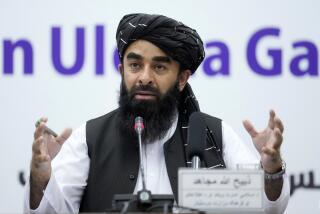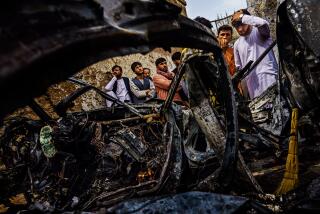No deal yet between U.S., Afghanistan on post-2014 pact
KABUL, Afghanistan — Negotiations on a post-2014 security agreement between the United States and Afghanistan remained unresolved Wednesday, less than 24 hours before Afghan President Hamid Karzai was scheduled to address a gathering of tribal leaders who were expected to vote on the proposed pact.
Talks have stalled over the issue of U.S. troops entering Afghan residential areas in pursuit of insurgents or terrorists. The U.S. wants its special-operations forces to continue night raids after Western combat troops depart at the end of 2014, but Karzai has insisted for months that only Afghan troops carry out such missions.
With or without an agreement, Karzai has said he will proceed Thursday with a loya jirga, or traditional gathering of Afghan notables, who will vote on the pact. Karzai controls selection of the delegates, so he could prevail on delegates to reject any security deal that does not reflect his demands on night raids.
An official at the presidential office said in a brief telephone interview Wednesday night that the loya jirga will proceed on schedule with Karzai delivering the opening address. The Afghan leader has proposed presenting the 2,700 delegates with a draft document containing both the U.S. and Afghan positions on night raids — and ask them to approve one.
The United States has warned that without a bilateral security agreement, no U.S. troops would remain after 2014. If so, billions of dollars in annual military and development aid to Afghanistan also would be at risk, and NATO members would almost certainly make no post-2014 commitments to the Asian nation. Some aid agencies would likely cut back operations because of security concerns.
The United States seeks to deploy a limited number of U.S. military advisers after 2014 to train Afghan security forces and provide logistical assistance. Washington also wants access to nine military bases built by the U.S., which will be transferred to Afghan authority after 2014. Karzai surprised U.S. officials in May by suddenly naming the nine bases in a speech.
Afghan military commanders readily concede that their army and police could not sustain the fight against Taliban insurgents without continued infusions of U.S. cash for salaries, weapons and equipment, or without continued U.S. logistical support.
According to Karzai’s spokesman, a deal proposed Tuesday in a phone call between Karzai and Secretary of State John F. Kerry suggested a letter from President Obama acknowledging past “mistakes” by U.S. troops and the suffering of Afghans in cases of civilian casualties. The proposed letter also would commit the U.S. to avoid future mistakes in “a different environment” after 2014, according to the spokesman.
The security pact would include language authorizing U.S. military operations in residential areas under “extraordinary circumstances,” and only if the lives of U.S. troops were directly at risk, according to the Afghan version of events.
U.S. State Department spokesman Jen Psaki has refused to confirm discussions of any letter on night raids, and the Afghan government indicated Wednesday that no letter has been forthcoming. The only thing the two sides seemed to agree on during the day was that negotiations were continuing.
Some news agencies reported that Karzai’s spokesman, Aimal Faizi, said the Afghan leader had demanded a U.S. apology. Faizi did not mention an apology in a late-night briefing to reporters here Tuesday.
U.S. National Security Council spokesperson Caitlin Hayden said in a statement issued Wednesday morning Kabul time: “Reports that the United States intends to apologize are not accurate. No apology has been discussed.
“We continue to consider how we can best provide the government and people of Afghanistan appropriate assurances as the loya jirga considers the bilateral security agreement,’’ Hayden added.
In Kabul, preparations continued Wednesday for the loya jirga. A news briefing with the gathering’s top two leaders was abruptly canceled, but reporters were later told to report to the site early Thursday morning for the event.
Kerry rejected an invitation to address the loya jirga to explain the U.S. position, according to a statement from Karzai’s office. Instead, Kerry offered to provide “clearly written assurances” that the U.S. government recognizes Afghan concerns about “mistakes” made in past U.S. military raids, the statement said.
When Karzai asked that the letter come directly from Obama, Kerry agreed to take the proposal to the president, according to Faizi.
The loya jirga is an advisory body only, but Karzai has indicated he will not sign the security agreement unless the assembly approves it. The Afghan parliament also must approve the pact.
Karzai, known for brinkmanship and volatility, made no public comments Wednesday as security forces extended their cordon around the loya jirga site in Kabul following a suicide car bombing Saturday that killed at least 13 Afghans and wounded 29 nearby. Faizi did not return calls and messages seeking comment.
A U.S. Embassy spokesman, Robert B. Hilton, declined comment Wednesday, citing embassy policy of not discussing ongoing negotiations. Ambassador James B. Cunningham is the top U.S. negotiator in Kabul for the security agreement.
The independent Afghanistan Analysts Network, an authoritative Kabul think tank, quoted Karzai’s national security advisor, Rangin Dadfar Spanta, as telling members of parliament over the weekend that the U.S. is requesting independent control of the massive Bagram air field north of Kabul and air access to and from Afghanistan from bases in Bagram, Kabul and three other Afghan cities.
Also Wednesday, a bomb exploded in a crowded restaurant in Kandahar in southern Afghanistan, killing three civilians and wounding 22, Javid Faisal, a spokesman for the provincial governor, said in a telephone interview. Faisal blamed the bombing on Taliban insurgents, who control much of Kandahar province.
ALSO:
U.S. ambassador to China Gary Locke to resign
Obama asks Senate leaders to hold off on new Iran sanctions
Mexican cartels abet heroin and meth surge in U.S., DEA study says
Twitter: @davidzucchino
More to Read
Start your day right
Sign up for Essential California for news, features and recommendations from the L.A. Times and beyond in your inbox six days a week.
You may occasionally receive promotional content from the Los Angeles Times.







